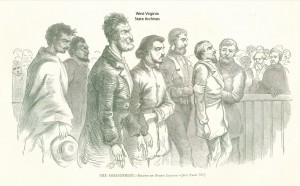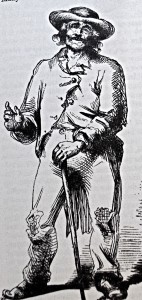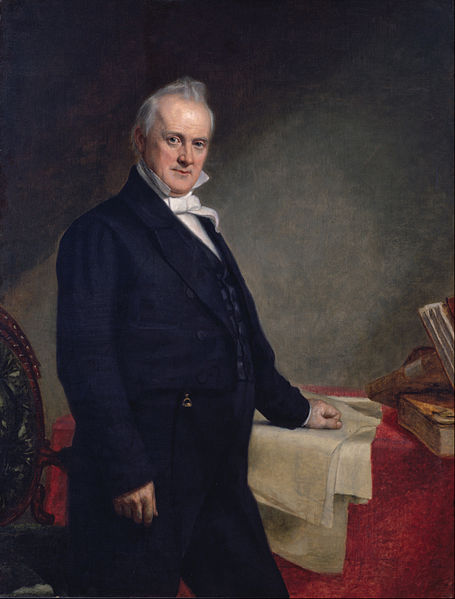495 words
VIDEO: “Why Did Virginia Try John Brown?” – Dennis Frye TRT: 4:03
Why did the state of Virginia try John Brown and not the federal government?

Brown attacks a United States government installation. Brown seizes a United States armory and the United States arsenal at Harpers Ferry. Brown is seized by United States marines. He is surrounded, captured on United States property; and so why all this repetition of “the United States”? – because he attacked the United States. Yet he does not end up in a federal court. He is not brought to trial in a United States courtroom, but instead comes the trial here in a circuit court in Jefferson County, Virginia. So how did Virginia gain possession of Brown?

Well, you know we must understand that Brown at that time and the country at that time was very much “state ascension,” state ascension government. State government is where people looked for their government. For people who lived here in Virginia, Richmond was their principal government, not Washington. The federal government was not nearly the central government that we think of it as today. The principal job of the central government was to provide for the defense of the country, to provide for for international commerce, intercourse – those types of things. But the idea that the strength of the federal government, the concept that the americans looked to Washington for guidance and direction was very foreign at that time. It was much more local, much more focused on state government. You could probably know and name your local legislator, much more difficult to name your federal legislator. You would perhaps know your local legislator, probably never met your federal legislator; and so, when the question came of who should have Brown, who should handle Brown,

Virginia said “We want him, he attacked our people, he killed our people, he attacked our town, he threatened our way of life, he attempted to steal our property, these are Virginia issues, these aren’t issues of the federal government, these aren’t issues of Washington. This man should be tried by Virginians.” So the plea was made to have Virginia have supremacy. It was readily acceded to.

James Buchanan did not want to touch John Brown. I often think of John Brown here as Pontius I mean James Buchanan, the president of the United States did not want to touch John Brown. I often think of Buchanan here as Pontius Pilate – “why do I want to deal with this person?! If somebody else does, if somebody else wants him, let them have him, let the people of Jefferson County and the people of Virginia have him!” It was much more intimate and immediate for Virginia, who is the victim than for the United States government, to take John Brown

Ultimately, what’s on trial is not Brown but slavery. Slavery is the issue that’s on trial and James Buchanan, president United States, didn’t need to put slavery on trial. He didn’t want to put slavery on trial. So Virginians said: “I want him” and Virginians got him and Virginians found him guilty and Virginians executed John Brown.

References:
“James Buchanan.” Wikipedia English. Latest update 27 Oct. 2009. Web. 2 May 2011. http://en.wikipedia.org/wiki/James_Buchanan
“John Brown His Soul Goes Marching On. The Raid.” West Virginia Archives and History. 25 July 2008. Web. 10 July 2010.
“John Brown trial” Leslie’s. (November 12, 1859). Frank Leslie’s Illustrated Newspaper. Print.
“John Brown trial” Leslie’s. (November 12, 1859). Frank Leslie’s Illustrated Newspaper. “John Brown His Soul Goes Marching On. The Trial. Newspaper Sketches.” West Virginia Archives and History. 25 July 2008. Web. 10 July 2010.
Video:
Frye, Dennis. “Why Did Virginia Try John Brown?.” American Military University Civil War Scholars. 14 April 2011. Web. 2 May 2011.
Flickr Set:
courtroom.jpg
“John Brown trial” Leslie’s. (November 12, 1859). Frank Leslie’s Illustrated Newspaper. Print.
“John Brown trial” Leslie’s. (November 12, 1859). Frank Leslie’s Illustrated Newspaper. “John Brown His Soul Goes Marching On. The Trial. Newspaper Sketches.” West Virginia Archives and History. 25 July 2008. Web. 10 July 2010.
jbrownarraign.jpg
“John Brown trial” Leslie’s. (November 12, 1859). Frank Leslie’s Illustrated Newspaper. Print.
“John Brown trial” Leslie’s. (November 12, 1859). Frank Leslie’s Illustrated Newspaper. “John Brown His Soul Goes Marching On. The Trial. Newspaper Sketches.” West Virginia Archives and History. 25 July 2008. Web. 10 July 2010.
courthouseleslie.jpg
“Charles Town Courthouse.” (November 19, 1859). Frank Leslie’s Illustrated Newspaper. Print.
“Charles Town Courthouse.” (November 19, 1859).Frank Leslie’s Illustrated Newspaper. “John Brown His Soul Goes Marching On. The Trial. Newspaper Sketches.” West Virginia Archives and History. 25 July 2008. Web. 10 July 2010.
(oldman) dhs.2.peerage.140.jpg
Strother, David H., “Personal Recollections of the Civil War.” Harper’s New Monthly Magazine, New York, NY: Harper and Bros.
Volume 33, Issue: 194, July, 1866. pp. 137-160. Print.
Strother, David H. (July, 1866). “Personal Recollections of the Civil War.” Harpers Magazine. 7 May 2008. Web. 20 Oct. 2010.
cook.jpg
(enslaved1) dhs.5.black.177.jpg
Strother, David H., “Personal Recollections of the Civil War.” Harper’s New Monthly Magazine, New York, NY: Harper and Bros. Volume 34, Issue: 200, January, 1867. pp. 172-192. Print.
Strother, David H., (Jan., 1867). “Personal Recollections of the Civil War.” Harpers Magazine. 7 May 2008. Web. 20 Oct. 2010.
